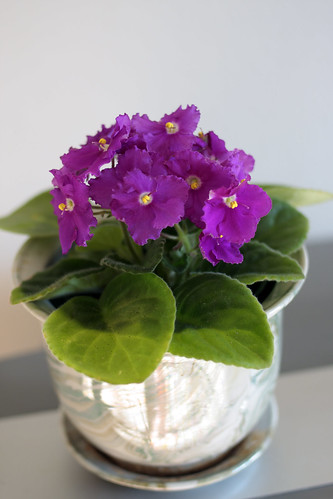
African Violet, originally uploaded by Edward Kaye.
By Terri T. Johnson
Growing an African violet is not difficult. Just find a sunny, preferably east-facing window and place the plant on the windowsill.
Native to humid areas, an African violet likes humidity so a kitchen
window above the sink can be ideal.
Known officially as Santpaulia, the plant is actually a genus of six
species of herbaceous perennial flowering plants native to Tanzania and to neighboring southeast Kenya. Hence, African violet.
The vibrant green, fine-haired leaves provide a stark contrast to the soft white, pink or violet flowers that grow in clusters near the center of the plant.
The showy plant does require some work, like proper watering,
fertilizing and exposure to light, but it’s nothing even the most inept
gardener can’t handle.
There are several ways to obtain an African violet, the most common
being to buy one, usually at a supermarket, home improvement or
discount-type store or a nursery.
Another way is to find a friend or family member who grows the violet
and take a leaf cutting. Some recommend dipping the cutting in a
special solution, but an easier, and less expensive way, is to simply
place the cut leaf in a small vase with water.
A clear shot glass or small juice glass is an excellent way to start the leaf to root.
Do not allow the water to touch the actual leaf. Just submerge the
stem. Place the glass in an area where it won’t be disturbed and watch for the roots to form. Once the root system is established, plant the leaf and watch the plant take shape. This method takes longer than simply buying a plant, but it is less expensive.
For those who buy a plant, the experts recommend repotting it almost
immediately. Clay or plastic pots are fine, but make certain there are
drainage holes-one hole is acceptable-and place a pebble on each
drainage hole.
Fill the pot about halfway with African violet soil, place the plant in
the middle and fill the remainder of the pot with soil. A teaspoon
works well to add the soil without damaging the actual plant. Tamp down the soil and add more if necessary.
Always place any African violet pot in a saucer and then fill the
saucer with tepid water and let sit for about an hour. Take the pot out
of the saucer and empty any remaining water and return the saucer to
under the pot.
Light is important, that’s why an east window is good, but a
north-facing window will also work.
If the plant doesn’t flower, it’s probably not getting sufficient
light, and if the leaves develop brown edges or brown spots, it’s
getting too much light. Pay attention to the plant. It will let you
know when it’s not happy.
Water is also vital. Never, never water an African violet from above
leaving wet spots on the leaves. And never, never use cold water. Fill
a watering can and let it sit, maybe for several days to allow the
water to reach room temperature and for the additives, like chlorine
and fluorides, to evaporate.
One way to test if an African violet needs to be watered is to stick
your finger in the soil. If the soil sticks to your finger and feels
damp, don’t water. If the soil does not stick, it’s probably a good
time to add a little water from a watering can with a small spout
directly on the soil.
Once the flowers are through blooming, like with any plant, deadhead it by gently cutting or pinching off the dead blooms.
Growing African violets is relatively easy but fungal, bacterial and
viral diseases can strike, and the plant can become home to certain
parasites.
Don’t panic, just keep the plant happy with the correct
amount of light and water, with a little fertilizer thrown in and
beautiful flowers will be the reward.
Terri T. Johnson is a staff writer at The Almanac weekly newspaper in McMurray, Pa. This column first appeared in its Suburban Living magazine's February/March edition.

No comments:
Post a Comment